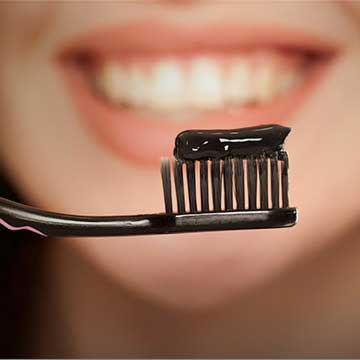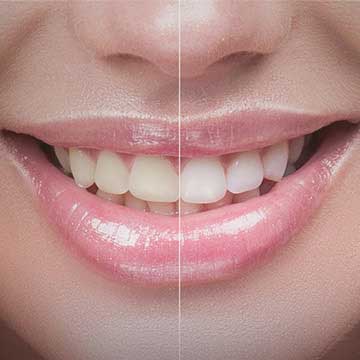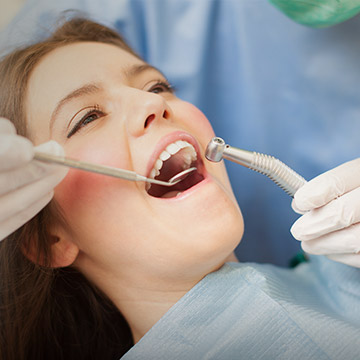Living with the pain and discomfort of temporomandibular joint (TMJ) disorder can be a challenge for those living with the condition. It can come with uncomfortable symptoms like tension headaches, jaw pain, and difficulty chewing and speaking.
Fortunately, it’s possible to find relief. While there is no guarantee of a permanent cure for TMJ disorder, there are strategies for treatment and long-term relief:
- Mouth guards
- Dental Botox
- Surgical interventions
- Lifestyle changes
- Massage or hot and cold therapy
Seeking a permanent solution for TMJ might feel daunting, but it can be an achievable goal with the right information and approaches. A great place to start is talking with your dentist. They can examine your mouth and determine the root cause of your uncomfortable symptoms.
What Is TMJ?
TMJ disorder, or TMD, is a condition that affects the temporomandibular joint, which acts as a hinge connecting your jawbone to your skull. This joint allows you to move your jaw up and down and side to side, enabling actions like speaking, chewing, and yawning.
When this intricate system experiences imbalance or damage, the result can be a cocktail of discomfort ranging from clicking or popping sounds when opening or closing the mouth to more severe forms of pain and lockjaw.
Causes of TMJ
The causes of TMJ disorder can be multifaceted and can vary from person to person. Some common causes include:
- Injury or trauma to the jaw or joint
- Arthritis
- Overuse of the jaw muscles
- Bruxism, or teeth grinding
- Genetics
- Other painful medical conditions
Symptoms of TMJ
TMJ can have numerous symptoms depending on its severity. You might experience:
- Persistent or recurring pain or tenderness in the face, jaw joint area, neck, or shoulders
- Difficulty or discomfort when chewing
- Swelling around the face
- Limited motion of the mouth or a feeling of misalignment
- Aching pain around the ear or ringing
- Clicking, grating, or popping sounds in the jaw joint
- Locking or tightness of the jaw joint
These symptoms could also result from other medical conditions. So, it’s crucial to see a healthcare provider, such as your dentist, who can examine your mouth and accurately diagnose the issue. Regular dental exams can also serve as a part of your overall healthcare, as your dentist examines more than just your teeth and can detect other underlying conditions.
Diagnosing TMJ
To diagnose TMJ disorder, a dentist will ask you about your symptoms and examine your mouth and jaw. In some cases, advanced imaging may be helpful.
Noninvasive Treatments as the First Line of Defence
For many, the initial approach to TMJ treatment involves noninvasive methods. Treatments might include:
- Mouth guards, which help to prevent teeth grinding and clenching
- Physical therapy incorporating jaw exercises, massage, and muscle-strengthening techniques
- Medications, such as muscle relaxants, anti-inflammatories, and pain relievers, to alleviate discomfort and control swelling/pain
Muscle-Relaxing Treatment
Another non-invasive treatment that shows promise for long-term relief of TMJ pain is a form of dental Botox. Dental Botox works by the dentist injecting the medication into the clenching muscles of the jaw and relaxing them, which can reduce the tension and alleviate the pain.
When Is Surgery Needed?
Noninvasive treatments may not be effective in some instances, and more invasive procedures become a consideration. Surgeries for TMJ may include removal of joint fluid, open joint surgery, or others.
Surgery is usually treated as a last resort, but it can provide substantial relief for patients with severe, unyielding symptoms.
Is TMJ Permanent?
TMJ is not always necessarily permanent, and may even be temporary in some individuals. However, it’s crucial to work towards managing the symptoms when they arise. While it’s unlikely to be a permanent solution, optimizing your lifestyle to support healthier jaw function is an important part of managing TMJ symptoms. Certain lifestyle changes can offer long-term relief:
Diet & Nutrition
Consuming a diet that includes softer foods can lessen the strain on your jaw muscles and joints. It’s also important to avoid hard, crunchy, or chewy foods that can exacerbate symptoms. Staying hydrated and ensuring your diet has enough calcium and magnesium can also contribute to muscle health.
Stress Management
Stress can be a significant contributing factor to teeth grinding and clenching. Practices such as meditation, yoga, and deep-breathing exercises can be integral in reducing stress and thus reducing TMJ symptoms.

Self-Care for Your Jaw
Incorporating targeted exercises and self-care routines can go a long way in managing TMJ pain and promoting jaw health:
Jaw Massage
Massaging the jaw can help to relieve tension in the joint. Using your fingertips, gently knead the jaw muscles in a circular motion to encourage relaxation.
Heat & Cold Therapy
Applying a warm compress to the jaw can help to increase blood flow and relax the muscles. Cold packs can reduce swelling and numb the area to alleviate pain. You can combine massage with this treatment as well.
Preventing TMJ from Making a Return
Once you’ve rid yourself of the uncomfortable symptoms, it’s crucial to maintain a lifestyle that minimizes the chance they return.
- Regularly visit your dentist for check-ups to monitor for any potential TMJ complications.
- Continue with any recommended exercises or physical therapy.
- Be mindful of stress and practice stress-reducing techniques regularly.
- If you’re prone to clenching or grinding your teeth, continue using a dental guard, especially at night.
- Avoid chewing gum
Embracing a Pain-Free Jaw Future
While a permanent cure for TMJ might be a complex goal, a multifaceted approach to its management can significantly reduce its impact on your quality of life. It begins with understanding the disorder, taking steps toward diagnosis, and embracing a holistic treatment plan.
Call us at Otara Dental today to book an appointment with one of our experienced dentists. We’re happy to sit down and discuss your options for ridding yourself of the uncomfortable symptoms related to your TMJ.









